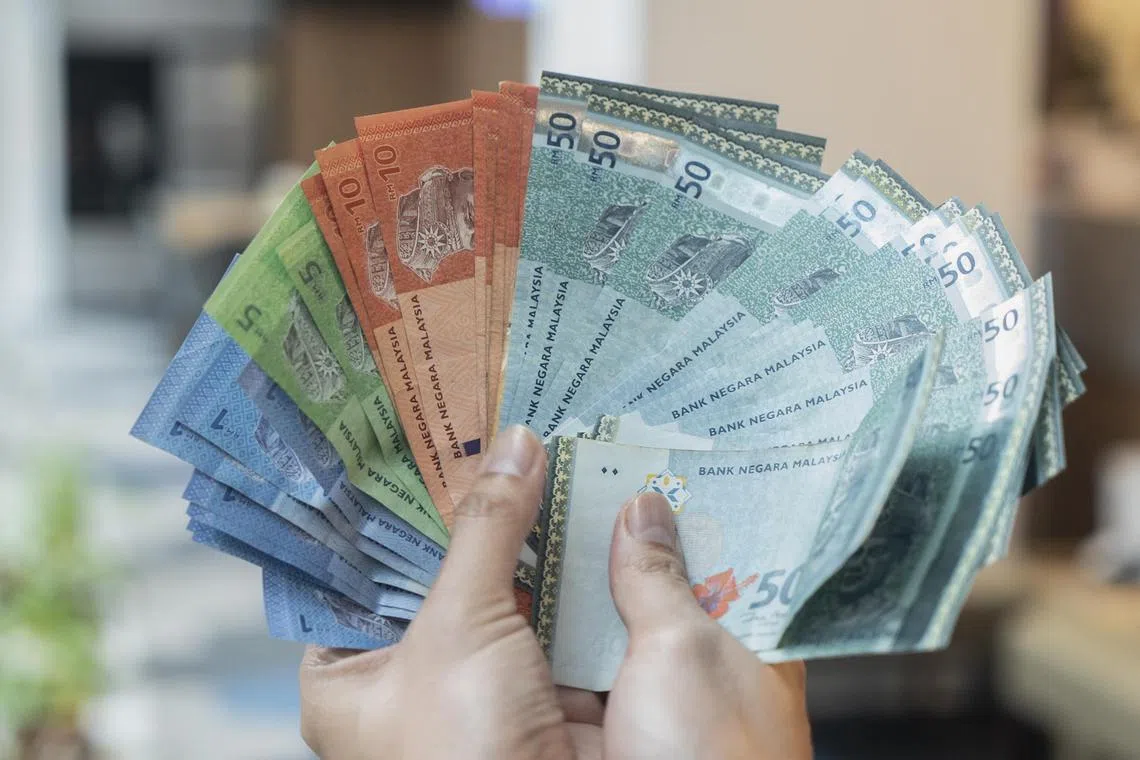Malaysia expects ringgit to rise this year, rules out currency peg
Sign up now: Get ST's newsletters delivered to your inbox

The ringgit has fallen about 3.7 per cent this year so far and briefly hit a 26-year low last week.
ST PHOTO: SHINTARO TAY
KUALA LUMPUR - Malaysia’s finance ministry on Feb 29 dismissed adjusting monetary policy or pegging the ringgit to support the weakened currency, saying it expects the ringgit’s value to appreciate in 2024.
The ringgit has fallen about 3.7 per cent in 2024
Second Finance Minister Amir Hamzah Azizan told Parliament the central bank’s monetary policy adjustments were not aimed at influencing foreign exchange, adding that any increase in the country’s benchmark interest rate risked burdening the people.
The ringgit’s weakening was largely due to external factors, including strength in the United States dollar and economic uncertainty in China, and did not reflect Malaysia’s positive economic fundamentals and prospects, he said.
“As exports improved in January and investment prospects are very good... with the focus on ease of doing business (in the country), I believe the ringgit will perform better this year,” he added.
He reiterated that there were no plans for Malaysia to peg the ringgit to the US dollar as it had done during the 1998 Asian financial crisis.
The finance ministry and Bank Negara Malaysia (BNM) have taken measures to address the ringgit’s depreciation, including encouraging state-linked companies to repatriate foreign investment income and convert the income into ringgit more consistently, Datuk Seri Amir Hamzah said.
BNM has also stepped up efforts to curb excessive movements in the ringgit’s value, and encouraged firms to use local currency for export settlements to reduce dependency on the dollar, he added.
Malaysia is expecting economic growth of between 4 per cent and 5 per cent in 2024, up from 3.7 per cent in 2023.
The central bank held its key interest rate unchanged at 3 per cent in January amid moderating inflation, and warned of risks to growth due to weaker-than-expected external demand and declines in commodity production. Economists expect BNM to hold rates steady until at least end-2025.
Investors meanwhile are eyeing a key threshold in the ringgit that may warrant a stronger intervention from the central bank.
State Street Global Advisors’ Mr Ng Kheng Siang, who started his career as a portfolio manager at BNM almost three decades ago, expects the authority to intervene at around 4.8 ringgit per US dollar. That is also a view held by analysts from banks including OCBC Bank and Sumitomo Mitsui Banking Corp, following policymakers’ recent verbal pushback. The currency last week briefly slipped past that level to the weakest since January 1998.
“The increased frequency of officials talking about the ringgit suggest that they have stepped up scrutiny,” said Mr Christopher Wong, a currency strategist at OCBC in Singapore. “If there is any sharp, one-sided move, then it may warrant some action.”
The US dollar’s resilience is adding to the pressure on the ringgit.
The ringgit’s slide has also become ammunition for the country’s opposition party, piling pressure on Prime Minister Anwar Ibrahim’s coalition government. Some analysts have said there is further risk the ringgit will weaken to record lows.
BNM governor Abdul Rasheed Ghaffour on Feb 27 said the ringgit ought to trade higher, given the nation’s positive economic outlook. He stopped short of saying officials will intervene in the market.
“The central bank’s primary objective is to prevent overshoot,” said Mr Ng, head of Asia-Pacific fixed income at State Street Global Advisors. “If they feel this has been achieved, there is no need to have large intervention.”
The ringgit rose 0.2 per cent to 4.7618 per US dollar as at 12.01pm in Kuala Lumpur. The Singapore dollar was trading at 3.5415 ringgit, unchanged from its Feb 28 close.
“Any actual intervention is likely to be more to lean against the wind than something aggressive,” said currency strategist Sim Moh Siong at Bank of Singapore. “Reserves adequacy is relatively lower compared to its Asian peers. That is a constraint.”
Malaysia held about US$115 billion (S$154.6 billion) of foreign reserves as at mid-February. REUTERS, BLOOMBERG


